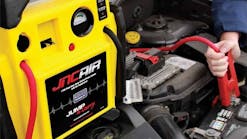Content powered by Motor Age. Click here for more service repair news and information.
When becoming a technician, you probably have a general idea of what it is going to be like. But, what are the things nobody tells you about before starting in the automotive industry?
We’ve been interviewing technicians for our Technician Spotlight blog series. We compiled a list based on the top things they wish they would’ve known before becoming a technician. Check out their answers below.
1. Do your training
In order to improve and advance in any career, you need to constantly be training. Nobody is an expert at fixing cars right away, and it takes time to learn. Training should be done both internally through the shop and externally outside of the shop. If you work at a shop that isn’t providing training, try to find training on your own. Being an automotive technician isn’t a profession you go to school for once and you’re set for your entire career. You will be learning new things from the first day you step into a shop all the way to the last.
2. Know your worth
Technicians are smart individuals and need to be recognized for their intelligence. It is no longer the greasy and dirty field it used to be. Vehicles today are changing by the minute with the advancements in technology. As a technician, It is important to understand your own worth when looking for a shop to work at. You deserve to be supported and appreciated. Find a shop that acknowledges your intelligence and appreciates the work you do.
3. Different types of shops
Not everyone likes to work at the same type of shop. Some technicians prefer to work for dealerships. Dealerships allow technicians to work on one specific brand of cars and become an expert on that brand. Other technicians prefer small independent shops. At independent shops, technicians work on many different types of cars. As a technician early in your career, it’s important to figure out which type of shop you like best, and where you will be the most successful.
4. It’s hard work, but rewarding
It can take time, but in the end, it is a great feeling to solve a problem someone is struggling with. This job can be very tough both physically and mentally. Most technicians get a thrill from solving the problems most people can’t. It makes you feel very accomplished and proud of the work you are doing. It is definitely not easy work, but the look on the customer’s face when you finally finish a big job makes it all worth it.
5. It can be expensive
The tools technicians have to pay for are extremely pricey. You may also have to pay for other things, including a toolbox, uniform, etc. Some shops will provide tools, but most require technicians to provide their own. As an entry-level technician, it is important to not stress yourself out and buy all your tools at once. If you can, come up with a budget and plan. This will allow you to steadily grow your tool collection without killing your bank account.
6. You don’t need expensive tools
We know being an automotive technician comes with its costs and can be an expensive career. Don’t be afraid to purchase off-brand or older tools. This job already comes with a lot of expenses. It’s important to know you don’t need to get the fanciest and newest tools. Older and off-brand tools work just as well and can save you a lot of money in the long run.
7. Networking
Get to know people who are in the automotive industry — Not just the technicians in your shop, but technicians from all over the place. The internet gives you the opportunity to talk and connect with technicians all over the country. Technicians have the opportunity to network through Facebook groups, online forums, LinkedIn, etc. Networking may even allow you to find an interest in the industry you didn’t know you had.
8. Communication skills
This is a skill I’m sure many technicians are surprised to see. Many young technicians don’t realize they’ll need to speak with customers throughout their career. Some customers like to speak directly with the technician about what is wrong with their car. Sometimes you’ll have to interact with customers who may not always be in the best mood or entirely understand what you’re talking about. It is important to develop and learn communications skills so you can handle these situations appropriately.
9. Don’t be afraid to make a mistake
Everybody makes mistakes — it is human nature. Try not to beat yourself up too much on the mistakes you make. Most of the time, the mistakes you make are a great learning experience. It can be stressful when dealing with cars because we know a mistake can be expensive. Don’t be afraid to ask for help when working on a new project.
10. Educate yourself
Educate yourself about all the different career paths you can take in the automotive industry. Do you want to work more in mechanical? Do you want to focus on diagnostics? Learn what skills you want to focus on in the shop and become a master at them. There are many branches to choose from. The advancements in technology are allowing technicians to become more involved with computers and technology. If this is something that interests you, take advantage of the opportunity.
11. Take advantage of master technicians’ knowledge
Master technicians have so much experience, and most likely have been in the industry for quite a while. Learn from them, and take in as much of their knowledge as possible. You’ll never be able to learn the experience of an automotive technician through a text book or training. Absorb the knowledge and experiences you get from senior technicians while you have them in the shop. Someday, they won’t be there to help you or learn from.
Information provided by WrenchWay



